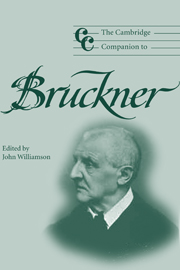6 - Bruckner and secular vocal music
from Part II - Choral music
Published online by Cambridge University Press: 28 September 2011
Summary
Background
The social upheavals that followed the French Revolution and its wars brought accelerating change to musical and concert life, including the rise of vocal and choral societies in many countries. Not only did they fulfil a social need, they enabled people to express feelings of patriotism which became more pronounced as the political map of Europe changed. The great choruses in Verdi's Risorgimento operas had their counterparts in the inspirational pieces for male-voice choir (Liedertafel) which became a vital part of music-making throughout Germany and Austria.
Germany led the way with Zelter's Berlin Liedertafel in 1809, followed by others in Leipzig, Breslau, Magdeburg, and Stuttgart. The first German choral festival took place in Plochingen (Württemberg) in 1827. In Austria, Metternich regarded any kind of popular movement with suspicion and initially refused to allow the establishment of choral societies. The founding of the Wiener Männergesang-Verein in 1843, however, provided the necessary impetus, as did the culturally and politically motivated cultivation of Austrian folksong. Frequent contacts between societies resulted in joint tours and choral festivals as symbols of ‘choral solidarity’. Beginning in the 1850s, choral festivals grew increasingly common in the 1860s, while enlarged bodies emerged such as the ‘Upper Enns Choral Association’ proposed by Josef Hafferl (the president of Linz's Frohsinn), Alois Weinwurm (the conductor of its Sängerbund), and August Göllerich senior in 1863. Its objects were to provide support for new and existing societies, to encourage the writing of new choruses by native composers, and to institute festivals such as the first Oberösterreich-salzburgische Sängerbundesfest in Linz from 4 to 6 June 1865.
- Type
- Chapter
- Information
- The Cambridge Companion to Bruckner , pp. 64 - 76Publisher: Cambridge University PressPrint publication year: 2004
- 1
- Cited by

